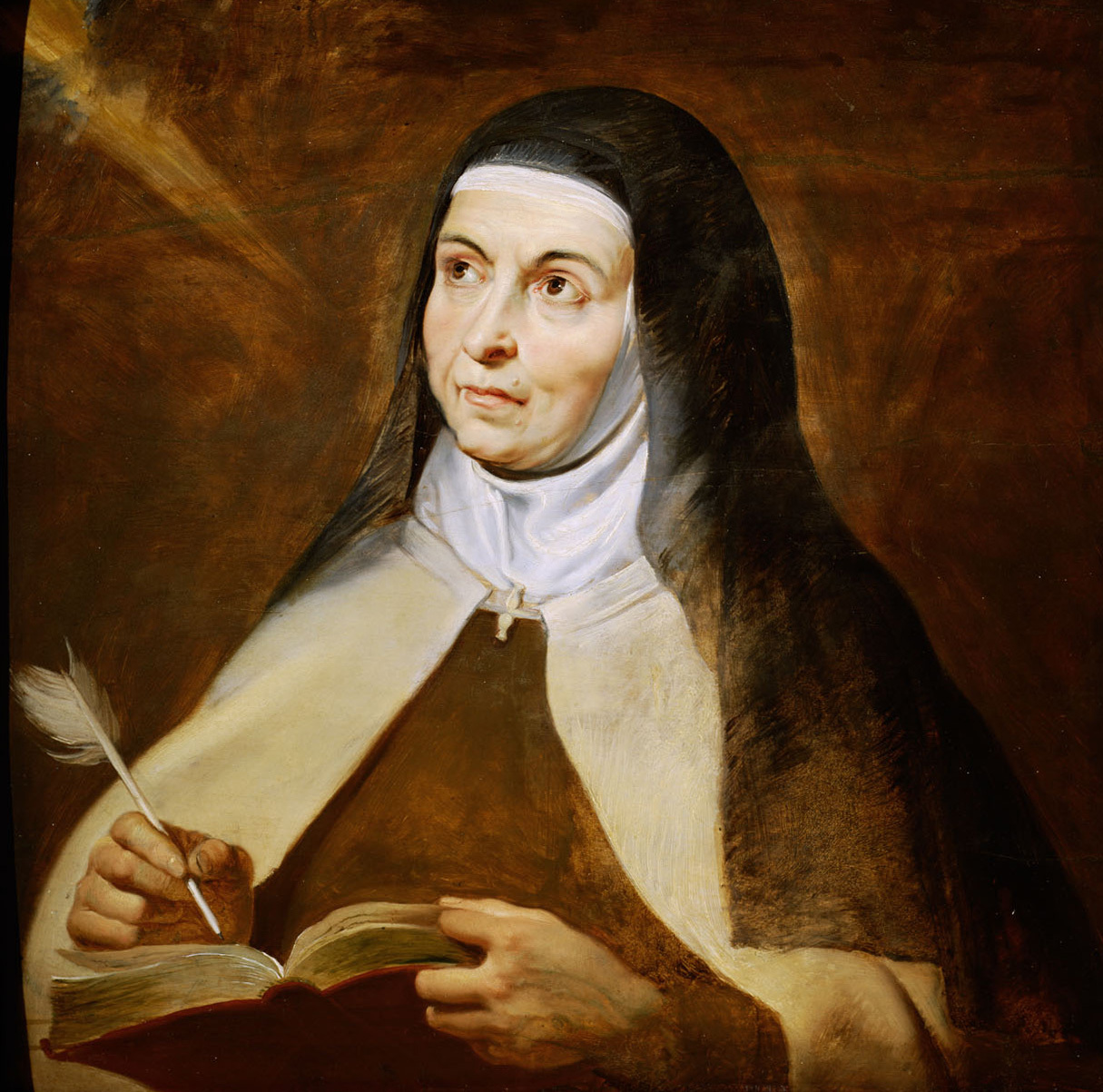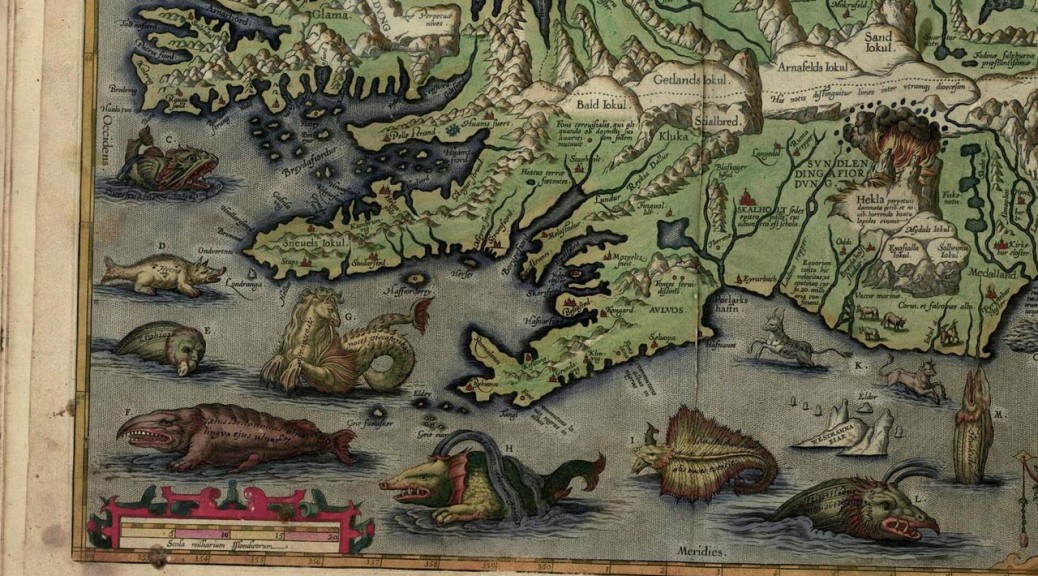
Category Archives: history

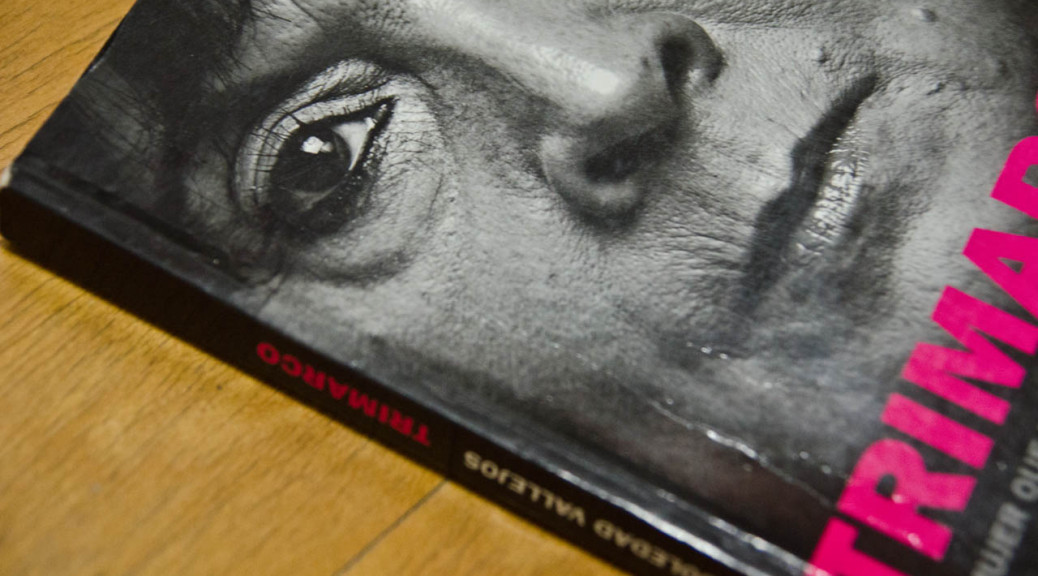
Trimarco
Vallejos, Soledad. Trimarco: la mujer que lucha por todas las mujeres. Argentina: Aguilar, 2013. Print.

A schematic showing global human trafficking, with specific focus to women and children. The map was based mostly on the UNODC map at http://strobelife.files.wordpress.com/2010/06/human_trafficking_map.gif and was accompleted with the moderate countries of origin of this map: http://www.thewe.cc/thewe_/images_5/bbc/_44425220_human_traffick_416map.gif Some simplifications were made; ie some countries on the first map shows that there are countries of both origin and destination; notably Poland, Czech republic, Pakistan, India and China. The exact route of trafficking can be seen (to some degree, maps don’t match fully) at http://www.fas.org/irp/threat/754727.gif A map showing the exact trafficking routes can be found at http://commons.wikimedia.org/wiki/File:Trafficking_of_women,_children_and_men_routes.svg. Via Wikimedia.
Fundacíon María de Los Angeles
Revolución Libertadora (1955-1958)
“el ingenio. Era una masa no tan lehana que humeaba y angustiaba fantasías infantiles con la leyenda tucumana por excelencia: El Familiar, mezcla de espíritu y animal fantástico aterrador; ser con el que el patrón de todo ingenio estaba obligado a pactar si quería una buena zafra. A cambio de salvarlo de la ruina, El Familiar reclamaba como prenda la vida de un cañero al menos una vez al año. Por eso –dice– en los surcos desaparecían obreros.” p. 21
Jardín de la República
La Alianza Anticomunista Argentina (AAA) – Triple A
Horacio Verbitsky | periodista y escritor | derechos humanos / kirchnerista.
“prosíbulos ruteros de las provincias.” p. 61
monja incendiaria (Berta Povalej) “La monja rezaría mucho, pero tenía debilidad por entreverarse en asuntos terrenales.” p. 64
“Las redes de trata existían, el tráfico de mujeres, su explotación sexual en distintas provincias por parte de familias que operaban como pequeñas empresas y se vinculaban entre sí, también.” p. 67
“Hablaba de procesiones, de rituales, de magia negra.” p. 68
“la mención de la Pomba Gira, esa diosa del panteón umbanda, era habitual en el mundo de los tratantes.
–Y me dijo que los tratantes suelen usar ese tipo de rituales como métodos de sometimiento, como forma de doblegar la voluntad de la víctima. Y que son usuales eso rituales, esas ofrendas.
No importa dónde estén ubicados geográficamente: las fotos de los allanamientos a prostíbulos alimentados con mujeres traficadas y esclavizadas coinciden, todavía hoy, en retratar esos altares. Negros las más de las veces, como bañados en la cera de decenas de velas derretidas; presididos por San La Muerte, la Pomba Gira o algún otro santo de imagen impactante y origen sincrético.” p. 69
“Por decreo de Carlos Menem de 1991, cada año en esa fecha, San Miguel se convertía en la capital de la Argentina. Kirchner llegaba a ratificar la tradición, a seis semanas de asumido el cargo: era puro carisma y magnetismo político.” p. 70
“–Ella viene conmigo–dijo secamente la monja en la esquina. Y pasaron la primera valla del operativo de seguridad.
Trimarco se vuelve a asombrar al recordarlo. “Era como si nos hubieran invitado a las dos. Era una cosa que pasábamos sí o sí.”” p. 71
“Desconcertada por lo imprevisto, iba a hacerlo cuando vio a Povalej levantarse rauda y hablar con los hombres, que desistieron enseguida.” p. 72
“Alicia recuerda que todo “era muy triste”. “Vos sabés las veces que yo he ido y a ella le habían cortado la luz, y estaba ahí, entre las velas. Habían vendido todo, porque era que le tenía que poner nafta a los policías, que no les pagaban viáticos, tenía que pagarles el café con leche o la comida.” p. 74
Trimarco y Verón fueron entrevistados en el programa de Guillermo Andino.” p. 77
“agosto de 2004 desaparecería la bióloga alemana Annagreth Würgler.” p. 78
“Susana… Incluso una vez se disfrazó de prostituta y se metió en la zona de los travestis, en La Rioja, averiguando cosas.” p. 79-80
“Dice la causa: “Trimarco investigó la desparición de su hija, entrando al mundo de la noche”” p. 80
“Trimarco contó una vez más todo lo que había pasado desde la última mañana que vio a su hija. “Me contó que se metía en los lugares, ella era muy activa en ir a los lupanares”, recuerda el ex ministro Béliz.” p. 92
lupanares: prostíbulo
“–Graciasm señor presidente.
–No me gias señor presidente, decime Néstor.
–Sí, señor presidente.” p. 95
“Casi sin respirar, agrega Trimarco que alguna otra vez Kirchnerle dijo algo que no puede olvidar.:
–La única que va a aclarar esto sos vos.” p. 96
***”Posse, además, insistía en que los eufemismos no eran tales: “Candy” y “El Desafío” no eran prostíbulos, sino “whiskerías”, las mujeres que estaban allí lo hacían por su propia voluntad y no eran prostitutas, sino coperas que acompañaban a los clientes y tomaban algún trago con ellos.” p. 96
“Desde noviembre Trimarco insistía en que, de acuerdo con varios testimonios, Marita había sido aseinada y enterrada en una whiskeía que pertenecía a Lidia Irma Medina y sus hijos.” p. 102
“Cuatro días después, se había excavado en los patios de los prostíbulos “La isla” y “Candy”. Allí no habían restos humanos.” p. 102
“El cuerpo de Paulina Lebbos apareció a metros de una ruta en las afueras de la capital, un sábado cuando caían el sol. Dos muchachos de campo que pasaban al galope lo vieron y avisaron a la policía. La chica, de 24 años, llegvaba trece días desaparecida.” p. 102
“Periodistas locales que pasaron la noche en guardia al otro lado de la ruta, para no perder pisada de los trabajos policiales, todavía hoy recuerdan el aire viciado, el olor intenso que traía el viento y que se intensificó, más tarde, cuando el cuerpo fue preparado en el patio de la morgue para la autopsia. A Paulina, además, le faltaba parte de una pierna. Luego se sabría que no había muerto en el lugar donde había muerto en el lugar donde había sido hallada, que llevaba días fallecida, que alguien la había escondido y preservado hasta entonces.” 104
“Como erra su costumbre, Trimarco pidió una misa por su hija en la basílica Nuestra Señora de la Merced, la misma en la que Manuel Belgrano había rogado antes de la batalla de Tucumán.” p. 105
“La telenovela Vidas robadas mantendría distancias, pero en el corazón de la historia iba a latir el caso Verón.” p. 118
“Las dos muheres compartían un frente común: a diferencia de Fernández, sostenía que la ley no podía obligar a una víctima de trata a demostrar que había sido forzada, que estaba siendo sometida en contra de su voluntad, que no había dad su consentimiento para ser explotada.” p. 122
“el juicio de Bell Ville, en el que dos chicas secuestradas y explotadas habían sido juzgadas como victimarias de una tercera,” p. 128
Documentary “Fragmentos de una Busqueda” (2009) Dir. Pablo Milstein, Norberto Ludín.
“en la Argentina, de acuerdo con estudios de la Organización Internacional de Migraciones, el 80 por ciento de las víctimas de trata era personas nacidas en el mismo país.” p. 132-133
“un rumor persistente señalaba que en esa zona de La Rioja podía estar Marita, pero ya no viva, sino asesinada y enterrrada a la vera de la ruta, camino a la cordillera. Era una región largamente sospechada. De allí había desaparecido en 2004 la turista suiza Annagreth Würgler.” p. 135
“Quizá el ejemplo más claro fuera el personake de Nacha, la mujer del jefe de la red, una ex víctima explotada que había terminado por enamorar a su captor y convivir con él como su legítima ante los ojos de todos los demás, que ignoraban cómo se habían conocido.” p. 141
“hablaban de bueyes perdidos mientras la luz del día huía.” p. 144
“Si la madre de Marita arremetía contra puertas cuando estaba sola y nadie la escuchaba, acompañada de una cámara y un micrófono, ya premiada y en pleno armado de la Fundación, resultaba implacable.” p. 145
Trimarco: “‘Hago todo esto sin darme cuenta. Como madre, tengo el deber de luchar contra viento y marea para encontrar a mi hija.'” p. 145
“–Entré al Desafío, estructura de dos pisos, varias habitaciones, tipo hotelm un portón al costado. Arriba había un altillo, con un altar a San La Muerte, tenía que ponerle cadenas de oro. El Candy da al fondo de la casa de la Lidia Medina, la casa azul.” p. 157
“Trimarco se ha peleado definitivamente con casi todas las personas que comparten su cotidianeidad.” p. 159
On Trimarco: “Muy directa, muy transparente. Muy franca. Eso es bueno y a veces no tanto, en la relación con ella se generan a veces situaciones por eso. Pero las prefiero”. p. 160
“Piquillín, una pequeña localidad cordobesa. Era jueves. Querían desenterrar restos para saver si la historia de “la tucumanita”, como las prostitutas de los locales “Las vampiras” y “El mote” llamadan al alma en pena de una joven aseinada por proxenetas, se correspondía con la realidad. Si ahí yacía un cuerpo, algunos indicios de testimonios hacían sospechar que podía ser el de Marita Verón.” p. 162
“Pero después, cuando entendés, cada vez que se paraba la máquina, lo que hacías era rezar para que no fuera un hueso humano. Lo que tiraba eran huesos de perro, de pollo…–dice D’Antona.” p. 163
“Ese día, la fiscal abrió uno de los prostíbulos y lo que había no eran habitaciones, sino celdas. “Habitaciones de 3 por 3, colchones en el piso, cuchetas de tres, una sola ventilación, una habitación cuadradita así, no con rejas, sino con barrotes gruesos.”” p. 163
“D’Antona era un penalista que había defendido al ex presidente Carlos Menem en la causa por la explosión de la fábrica de armas de Río Tercero.” p. 165
“insistía en que el caso de Marita era de derechos humanos y ella, Trimarco, una luchadora que encarnaba la continuidad: significaba en el siglo XXI lo que Madres y Abuelas habían significado para el siglo XX.” p. 169
Book: Es Cristo que pasa by Josemaría Escrivá de Balanguer (founder of Opus Dei)
“También en el terreno del juicio por su hija, la figura de Trimarco sirvió de excusa para que terceros delimitaran campos y plantearan confrontación kirchnerismo-antikirchnerismo.” p. 209
El zar tucumano by José Sbrocco (unauthorized biography of José Alperovich)
See article: “Un periodista de Mendoza dice que ‘Marita no fue secuestrada, sino qie ejercía la prostitución por su cuenta.” Contexto magazine. Found in Notas p. 221
“Trimarco criticó a la policía por la ceguera, porque el machismo impedía a los oficiales tomar denuncias, actuar rápido, rescatar a chicas de sus victimarios.” p. 238
“Han afirmado muy bien los miembros del tribunal: lo que necesitan ellos es tener pruebas”, dice, convencida de que los testimonios no lograron aportar la luz suficiente para condenar a nadie.” p. 239
“Stella Maris Córdoba celebró que la ley nueva no dijera que una víctima puede consentir su explotación,” p. 240
“¿Que sufren las víctimas? La desconfianza permanente en el proceso penal, cuando saben que su victimario puede estar caminando a la vuelta de la esquina, amenazando tanto a ella como a su familia.” p. 240
“No importó el partido político: todos los representantes coincidían en la importancia de Trimarco, en la visibilidad que si tenacidad había dado a un tema que, hasta 2002, no figuraba en la agenda política, y mucho menos en la agenda pública.” p. 241
Fiction films on human trafficking: Trade, Srpski film (A Serbian Film), Taken, Nina, La mosca en la ceniza y Tráfico humano (list from wikipedia entry: Trata de personas)
La Mosca en la ceniza (2010) Dir. Gabriela David
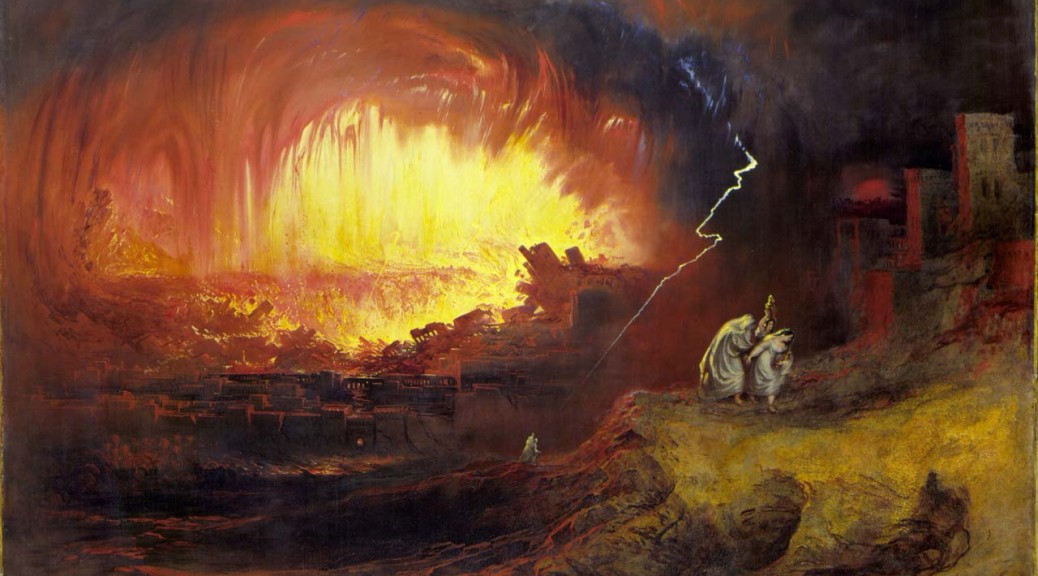
To Read (20th Century)
James Baldwin (US) |
Notes of a Native Son, The Fire Next Time, No Name in the Street, The Devil Finds Work
—
Jorge Luis Borges (Argentina)|
Historia universal de la infamia, Ficciones, El Aleph.
—
R. K. Narayan (India)|
Swami and Friends, The Bachelor of Arts, The English Teacher. See his works on mythology/religion (Gods, Demons and Others, The Ramayana) see list of works.
—
Graham Greene (England)|
The Comedians, The Heart of the Matter, A Burnt-Out Case, The Quiet American, The End of the Affair, The Ministry of Fear, Our Man in Havana, Monsignor Quixote
—
Robertson Davies (Canada)|
The Salterton Trilogy, The Cornish Trilogy, The “Toronto Trilogy”
—
Giorgio Bassani (Italia)|
The Garden of the Finzi-Continis
—
Mordechai Richler (Canada)|
The Apprenticeship of Duddy Kravitz, Barney’s Version, Solomon Gursky Was Here
—
Brian Moore (Northern Ireland/Canada)|
Judith Hearne, The Emperor of Ice-Cream, Black Robe
—
Evelyn Waugh (England)|
Decline and Fall, A Handful of Dust, Brideshead Revisited, Sword of Honour
—

Nicolas Poussin, The Dance to The Music of Time, 1640. Wallace Collection, London. Via Wikimedia.
Anthony Powell (England)|
—
Marcel Proust (France)|
—
Robert Musil (Austria)|
—
James Joyce (Ireland)|
Ulysses, Finnegan’s Wake, Dubliners, A Portrait of the Artist as a Young Man
—
Simone de Beauvoir (France)|
The Second Sex, She Came to Stay, The Mandarins
—
Bertolt Brecht (Germany)|
Threepenny Novel, Drums in the Night, The Modern Theatre Is the Epic Theatre.
—
Wole Soyinka (Nigeria)|
Aké: The Years of Childhood, Death and the King’s Horseman, The Lion and the Jewel
—
Jean Cocteau (France)|
Les Enfants Terribles, Les Parents Terribles, Beauty and the Beast, Orpheus
—
Jacques Prévert (France)|
Les Enfants du Paradis, Paroles (wrote scenarios and dialogues for films. See list)
—
Toni Morrison (US)|
Beloved, Song of Solomon, Sula, The Bluest Eye
—
Italo Calvino (Italia)|
Invisible Cities, If on a winter’s night a traveler, Our Ancestors trilogy, Cosmicomics
—
Leonardo Sciascia (Italia)|
Una storia semplice, The Day of the Owl, To Each His Own. See films: Open Doors (1990), Cadaveri Eccellenti (1976) and Il giorno della civetta
—
Cesare Pavese (Italia)|
The Moon and the Bonfires, see translated poems.
—
Natalia Ginzburg (Italia)|
L’inserzione, Family sayings (Lessico famigliare), Caro Michele (film Caro Michele, 1976)
—
Georges Simenon (Belgium)|
Creator of detective Jules Maigret. Maigret and the Yellow Dog, Dirty Snow, Red Lights
—
Milan Kundera (Czech)|
The Unbearable Lightness of Being, The Joke,The Book of Laughter and Forgetting
—
Chinua Achebe (Nigeria) |
Things Fall Apart,No Longer at Ease, Arrow of God, A Man of the People, Anthills of the Savannah, An Image of Africa (lecture on Heart of Darkness)
—
Muriel Spark (Scotland)|
The Prime of Miss Jean Brodie, The Mandelbaum Gate, The Driver’s Seat, Memento Mori
—
Philip Roth (US)|
The Ghost Writer,American Pastoral, Sabbath’s Theater
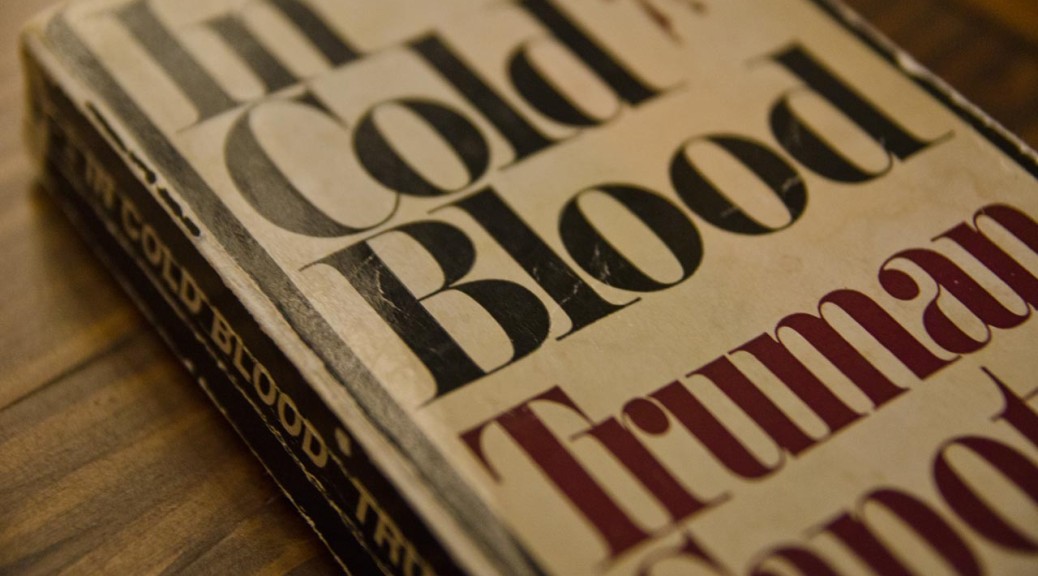
In Cold Blood | I
Capote, Truman. In Cold Blood. New York, New York: Signet, 1965.
“The depot itself, with its peeling sulphur colored paint, is equally melancholy; the Chief, the Super Chief, the El Capitan go by every day, but these celebrated expresses never pause there. No passenger trains do–only an occasional freight. p. 14
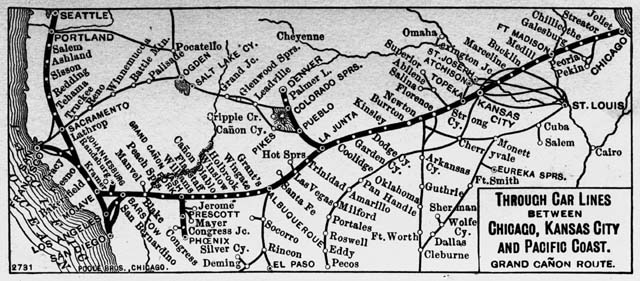
This reproduction of a cabinet card tacked to corkboard shows a map of the Grand Canyon Route of the Atchison, Topeka & Santa Fe Railway. The map title reads: “Through car lines between Chicago, Kansas City and Pacific Coast. Grand Canon Line.” Other notes read: “2731. Poole Bros. Chicago.” Between 1900 and 1905? Via Wikimedia.
Holcomb, Kansas
“ACAPULCO connoted deep-sea fishing, casinos, anxious rich women; and SIERRA MADRE meant gold, meant Treasure of the Sierra Madre, a movie he had seen eight times.” p. 25
“Since childhood, for more than half his thirty-one years, he had been sending off for literature (“FORTUNES IN DIVING! Train at Home in Your Spare Time. Make Big Money Fast in Skin and Lung Diving. FREE BOOKLETS…”), answering advertisements (“SUNKEN TREASURE! Fifty Genuine Maps! Amazing Offer…”) that stoked a longing to realize an adventure his imagination swiftly and over and over enabled him to experience: the dream of drifting downward through strange waters, of plunging toward a green sea-dusk, sliding past the scaly, savage-eyed protectors of a ship’s hulk that loomed ahead, a Spanish galleon –a drowned cargo of diamonds and pearls, heaping casket of gold.
A car horn honked. At last–Dick.” p. 27-28
“”Anybody wearing the fraternity pin,” he added, and touched a blue dot tattooed under his left eye–an insigne, a visible password, by which certain former prison inmates could identify him.” p. 35
“she had taken an apartment, then found a job–as a file clerk at the Y.W.C.A. Her husband, entirely sympathetic, had encouraged the adventure, but she had liked it too well, so much that it seemed to her unchristian, and the sense of guilt she i consequence developed ultimately outweighed the experiment’s therapeutic value.” p. 39
“A bookmark lay between its pages, a stiff piece of watered silk upon which an admonition had been embroidered: “Take ye heed, watch and pray: for ye know not when the time is.”” p. 42
Dick “The tattooed face of a cat, blue and grinning, covered his right hand; on one shoulder a blue rose blossomed. More markings, self-designed and self-executed, ornamented his arms and torso: the head of a dragon with a human skull between its open jaws; bosomy nudes; a gremlin brandishing a pitchfork; the word PEACE accompanied by a cross radiating, in the form of crude strokes, rays of holy light; and two sentimental concoctions–one a bouquet of flowers dedicated to MOTHER-DAD, the other a heart that celebrated the romance of DICK and CAROL,” p. 42
Dick “his eyes not only situated at uneven levels but of uneven size, the left eye being truly serpentine, with a venomous, sickly-blue squint that although it was involuntarily acquired, seemed nevertheless to warn of bitter sediment at the bottom of his nature.” p. 43
Perry “Blue-furred, orange-eyed, red-fanged, a tiger snarled upon his left biceps; a spitting snake, coiled around a dagger, slithered down his arm; and elsewhere skulls gleamed, a tombstone loomed, a chrysanthemum flourished.” p. 44
Dodge City, Kansas
“A hundred miles west and one would be out of the “Bible Belt,” that gospel-haunted strip of American territory in which a man must, if only for business reasons, take his religion with the straightest of faces, but in Finney County one is still within the Bible Belt borders, and therefore a person’s church affiliation is the most important factor influencing his class status.” p. 46
Mr. Clutter “he had no use for card games, golf, cocktails, or buffet suppers served at ten–or, indeed, for any pastime that he felt did not “accomplish something.” p. 47
“Not far from River Valley Farm there is a mysterious stretch of countryside known as the Sand Hills; it is like a beach without an ocean, and at night coyotes slink among the dunes, assembling in hordes to howl. On moonlit evening the boys would descend upon them, set them running, and try to outrace them in the wagon; they seldom did, for the scrawniest coyote can hit fifty miles an hour, whereas the wagon’s tip speed was thirty-five, but it was a wild and beautiful kind of fun, the wagon skidding across the sand, the fleeing coyotes framed against the moon–as Bob said, it sure made your heart hurry.” p. 51-52
“nuns, and anything pertaining to them, were bad luck, and Perry was most respectful of his superstitions. (Some other were the number 15, red hair, white flowers, priests crossing a road, snakes appearing in a dream.)” p. 55
“You are strong, but there is a flaw in your strength, and unless you learn to control it the flaw will prove stronger than your strength and defeat you.” p. 57
“Moreover, unlike Willie-Jay, he was not critical of Perry’s exotic aspirations; he was willing to listen, catch fire, share with him those visions of “guaranteed treasure” lurking in Mexican seas, Brazilian jungles.” p. 58
“A full moon was forming at the edge of the sky.” p. 63
****Susan “But when we got there–I didn’t want to do it. Go inside the house. I was frightened, and I don’t know why, because it never occurred to me…We walked in, and I saw right away that the Clutters hadn’t eaten breakfast; there were no dishes, nothing on the stove. Then I noticed something funny: Nancy’s purse. It was lying on the floor, sort of open. We passed on through the dining room, and stopped at the bottom of the stairs. Nancy’s room is just at the top. I called her name, and started up the stairs, and Nancy Ewalt followed. The sound of our footsteps frightened me more than anything, they were so loud and everything else was so silent. Nancy’s door was open. The curtains hadn’t been drawn, and the room was full of sunlight. I don’t remember screaming. Nancy Ewalt says I did–screamed and screamed. I only remember Nancy’s Teddy bear staring at me. And Nancy. And running…”” p. 75
“There’s been some kind of accident.’ Then we went in the house, the three of us. Went through the kitchen and saw a lady’s purse laying on the floor, and the phone to Nancy’s room, I noticed he kept his hand on it, ready to draw.” p. 78
***”We stepped back into the hall, and looked around. All the other doors were closed. We opened, and that turned out to be a bathroom. Something about it seemed wrong. I decided it was because of the chair–a sort of dining-room chair, that looked out of place in a bathroom.” p. 78
“I remember the sheriff searched around to see if he could find the discharged cartridge. But whoever had done it was much too smart and cool to have left behind any clues like that.” p. 79
“‘Where the devil can Herb be?’ About then we heard footsteps Coming up the stairs from the basement. ‘Who’s that?’ said the sheriff, like he was ready to shoot. And a voice said, ‘It’s me. Wendle.’ Turned out to be Wendle Meier, the undersheriff. Seems he had come to the house and hadn’t seen us, so he’d gone investigating down in the basement.” p. 79-80
“Well, I took one look at Mr. Clutter, and it was hard to look again. I knew plain shooting couldn’t account for that much blood. And I wasn’t wrong.” p. 80
“What he was pointing at was a bloodstained footprint. On the mattress box. A half-sole footprint with circles–two holes in the center like a pair of eyes.” p. 81
“A stocky, weathered widow who wears babushka bandannas and cowboy boots (“Most comfortable things you can put on your feet, soft as a loon feather”), Mother Truitt is the oldest native-born Holcombite.” p. 82
“For, feeling it their duty, a Christian task, these men had volunteered to clean certain of the fourteen rooms in the main house at River Valley Farm: rooms in which four members of the Clutter family have been murdered by, as their death certificates declared, “a person or persons unknown.”” p. 93
“not the slightest echo of gun thunder” p. 94
****”But the diary notation that most tantalized Dewey was unrelated to the Clutter-Rupp, Methodist-Catholic impasse. Rather, it concerned a cat, the mysterious demise of Nancy’s favorite pet, Boobs, whom, according to an entry dated two weeks prior to her own death, she’d found “lying in the barn,” the victim, or so she suspected (without saying why), of a poisoner: “Poor Boobs. I buried him in a special place.” On reading this… He determined to find the “special place” where Nancy had buried her pet, even though it meant combing the vast whole of River Valley Farm.” p. 101
“Outside, Dick said, “So you’re getting married next week? Well, you’ll need a ring.” … Perry was sorry to see them go. He’d began to half credit the make-believe bride, though in his conception of her, as opposed to Dick’s, she was not rich, nor beautiful; rather, she was nicely groomed, gently spoken, was conceivably “a college graduate,” in any event “a very intellectual type.”–a sort of girl he’d always wanted to meet but in fact never had.” p. 116
Perry “had lost his mother as well, learned to “despise” her; liquor had blurred the face, swollen the figure of the once sinewy, limber Cherokee girl, had “soured her soul,” honed her tongue to the wickedest point,” 153-154
“In Alaska, Tex taught his son to dream of gold, to hunt for it in the sandy beds of snow-water streams, and there, too, Perry learned to use a gun, skin a bear, track wolves and deer.” p. 155
“It would have been O.K. if only I hadn’t grown up; the older I got, the less I was able to appreciate Dad.” p. 155
“I had this great natural musical ability. Which Dad didn’t recognized. Or care about. I liked to read, too. Improve my vocabulary. Make up songs. And I could draw. but I never got any encouragement–from him or anybody else.” p. 155
“Well, while I was still in the Army, stationed at Fort Lewis, Washington, I’d bought a motorcycle (murdercycle, they ought to call them), and as soon as I got discharged I headed for Alaska. Got as far as Bellingham. Up there on the border. It was raining. My bike went into a skid.” p. 156
Letter from Perry’s sister Barbara “”Now, first, & most important–Dad is not responsible for your wrong doings or your good deeds. What you have done, whether right or wrong, is your own doing… Your letter implies that the blame of all your problems is that of someone else, but never you.” p. 163
Courthouse Pete “Pete, a tiger-striped tom weighing fifteen pounds, is a well-known character around Garden City, famous for his pugnacity, which was the cause of his current hospitalization; a battle lost to a boxer dog had left him with wounds necessitating both stitches and antibiotics.” p. 172
***”During this visit Dewey paused at an upstairs window, his attention caught by something seen in the near distance–a scarecrow amid the wheat stubble. The scarecrow wore a man’s hunting cap and a dress of weather-faded flowered calico. (Surely an old dress of Bonnie Clutter’s?) Wind frolicked the skirt and made the scarecrow sway–make it seem a creature forlornly dancing in the cold December field.” p. 177
“And listening to Dick’s conceited chatter, hearing him start to describe his Mexican “amorous conquests,” he thought how “queer” it was, “egomaniacal.” Imagine going all out to impress a man you were going to kill, a man who wouldn’t be alive ten minutes from now” p. 198
to read:
Helter Skelter by Vincent Bugliosi
to watch:
In Cold Blood (1967) dir. Richard Brooks. DP: Conrad Hall
Stanley Kubrick: Interviews, and BIFF Cinema Library
Found the Cinema Library at BIFF hill. shhhhh. no backpacks.
Stanley Kubrick Interviews by Gene D. Phillips.
“Kubrick is fiercely concerned with the accuracy of the small details that make up the background of his films, because he feels that helps the audience to believe what they see on screen.” viii
“Kubrick sometimes nursed ideas over long periods before he was able to bring them to fruition.” viii
“directing a film can be like trying to write War and Peace in a bumper car at an amusement park, when you finally get it right, there are not many joys in life that can equal that feeling.” p. xii
Dream Story by Arthur Schnitzler
Clean Break by Lionel White
To Read at the library:
book of essays and interviews on Wes Anderson
World Cinema by Geoffrey Nowell-Smith
John Ford
Planet Hong Kong by David Bordwell
Print the Legend: The Life and Times of John Ford by Scott Eyman
The Passion of David Lynch
books on Stanley Kubrick
Interviews with Scorsese, Ridley Scott, Kubrick, Bertolucci, Michael Mann.
books on Kurosawa
Lock, Stock and Two Smoking Barrels screenplay
Mediated Sex: Pornography and Postmodern Culture.
Goodfellas script
books on Cinematography
Eyes Wide Shut screenplay
The Making of Blade Runner
Boogie Nights script
Dark City (book on film noir)
Capote
Watched Capote (2005) | Dir.: Bennett Miller (Moneyball, 2011; Foxcatcher, 2014, ) To watch The Cruise (1998)

Eat Pray Love
Gilbert, Elizabeth. Eat, Pray, Love: One Woman’s Search for Everything Across Italy, India and Indonesia. New York, N.Y.; Penguin, 2007. Print. (First ed. 2006)
“When the Crusaders drove East for the holy wars, they witnessed worshipers praying with these japa malas, admired the technique, and brought the idea home to Europe as rosary.” p. 1
“the number 108 is held to be most auspicious, a perfect three-digit multiple of three, its components adding up to nine, which is three threes.” p. 1-2
“This division means that there are 36 tales in each section, which appeals to me on a personal level because I am writing all this during my thirty-sixth year.” p. 2
Om Namah Shivaya
“It wasn’t so much that I wanted to thoroughly explore the countries themselves; this has been done. It was more that I wanted to thoroughly explore one aspect of myself set against the backdrop of each country,” p. 37
“Therefore, what we today call French is really a version of medieval Parisian. Portuguese is really Lisboan. Spanish is essentially Madrileño. These were capitalist victories; the strongest city ultimately determined the language of the whole country.” p. 57
“What this congress decided would henceforth be considered proper Italian was the personal language of the great Florentine poet Dante Alighieri. When Dante published his Divine Comedy back in 1321, detailing a visionary progression through Hell, Purgatory and Heaven, he’d shocked the literate world by not writing in Latin.” p. 58-59
“He wrote his masterpiece in what he called il dolce stil nuovo, the “sweet new style” of the vernacular, and he shaped that vernacular even as he was writing it, affecting it as personally as Shakespeare would someday affect Elizabethan English.” p. 59
terza rima
“Dante writes that God is not merely a blinding vision of glorious light, but that He is, most of all, l’amor che move il sole e l’altre stelle… ” p, 60
il bel far niente “the beauty of doing nothing” p. 80
“For me, though, a major obstacle in my pursuit of pleasure was my ingrained sense of Puritan guilt. Do I really deserve this pleasure? This is very American, too–the insecurity about whether we have earned our happiness.”p. 81
“Dai, dai, dai, Albertini, dai … va bene, va bene, ragazzo mio, perfetto, bravo, bravo… Dai! Dai! Via! Via! Nella porta! Eccola, eccola, eccola, mio bravo ragazzo, caro mio, eccola, eccola, ecco–AAAHHHHHHHHH!!! VAFFANCULO!! FIGLIO DI MIGNOTTA!! STRONZO! CAFONE! TRADITORE! Madonna… Ah, Dio mio, perché, perché, perché, questo e stupido, e una vergogna, la vergogna… Che casino, che bordello… NON HAI UN CUORE, ALBERTINI! FAI FINTA! Guarda, non e successo niente.. Dai, dai, ah… Molto migliore, si si si, eccola, bello, bravo, anima mia, ah ottimo, eccola adesso … nella porta, nella porta, nell–VAFFANCULO!!!!!!!” p. 90-91
Augusteum
“The Augusteum warns me not to get attached to any obsolete ideas about who I am, what I represent, whom I belong to, or what function I may once have intended to serve… Even in the Eternal City, says the silent Augusteum, one must always be prepared for riotous and endless waves of transformation.” p. 100
magari (maybe, if only, I wish)
History of the Decline and Fall of the Roman Empire by Edward Gibbon
“Parla come magni.” p. 115
“Virginia Woolf wrote, “Across the broad continent of a woman’s life falls the shadow of a sword.” On one side of that sword, she said, there lies convention and tradition and order, where “all is correct.” But on the other side of that sword, if you’re crazy enough to cross it and choose a life that does not follow convention, “all is confusion. Nothing follows a regular course.”” p. 126
The Bhagavad Gita–that ancient Indian Yogic text–says that it is better to live your own destiny imperfectly than to live an imitation of somebody else’s life with perfection.” p. 127
“I drop out of my Italian-language school, having come to feel that it was interfering with my efforts to learn Italian, since it was keeping me stuck in the classroom instead of wandering around Italy, where I could practice with people in person.” p. 128
codega “a fellow you hired to walk in front of you at night with a lit lantern, showing you the way, scaring off thieves and demons, bringing you confidence and protection through the dark streets.” p. 135
“Or maybe I only want to go to Sicily because of what Goethe said: “Without seeing Sicily one cannot get a clear idea of what Italy is.”” p. 148
“Historians say that rhetoric was invented in Syracuse, and also (and this is just a minor thing) plot.” p. 150
The Italians (1964) by Luigi Barzini
“In a world of disorder and disaster and fraud, sometimes only beauty can be trusted. Only artistic excellence is incorruptible.” p. 152
“You were given life; it is your duty (and also your entitlement as a human being) to find something beautiful within life, no matter how slight.” p. 154
arati prayer
“Greek stoic philosopher Epictetus: “You bear God within you, poor wretched, and you know it not.”” p. 161
To Read: Epictetus
“”Our whole business therefore in this life,” wrote Saint Augustine, rather Yogically, “is to restore to health the eye of the heart whereby God may be seen.”” p. 162
To Read: Saint Augustine
“the monk quoted to me from the Bhagavad Gita, the most sacred ancient text of Yoga: “Oh Khrisna, the mind is restless, turbulent, strong and unyielding. I consider it as difficult to subdue as the wind.”” p. 174
Ham-sa mantra
Saint Teresa of Avila
“The most difficult challenge, the saint wrote in her memoirs, was to not stir up the intellect during meditation, for any thoughts of the mind–even the most fervent prayers–will extinguish the fire of God.” p. 190
kundalini shakti
“You gotta stop wearing your wishbone where your backbone oughtta be.” p. 199
guru gita
“Zen masters always say that you cannot see your reflection in running water, only in still water.” p. 226
Vipassana meditation
“”The world is afflicted with death and decay, therefore the wise do not grieve, knowing the terms of the world,” says an old Buddhist teaching.” p. 229
“Half the benefit of prayer is in the asking itself, in the offering of a clearly posed and well-considered intention.” p. 235
“Because if you can’t learn to master your thinking, you’re in deep trouble forever.” p. 236
“”Guilt’s just your ego’s way of tricking you into thinking that you’re making moral progress.”” p. 244
(Instructions for Freedom) “3. The day is ending. It’s time for something that was beautiful to turn into something else that is beautiful. Now, let go.” p. 245
“7. Let your intentions be freedom from useless suffering. Then, let go.” p. 246
“the rules of transcendence insist that you will not advance even one inch closer to divinity as long as you cling to even one last seductive thread of blame.” p. 247
“To know God, you need only to renounce one thing–your sense of division from God.” p. 255
Sextus “”The wise man is always similar to himself.” p. 256
Sentences of Sextus
turiya state (pure consciousness)
“We search for happiness everywhere, but we are like Tolstoy’s fabled beggar who spent his life sitting on a pot of gold, begging for pennies from every passerby, unaware that his fortune was right under him the whole time. Your treasure–your perfection–is within you already. But claim it,” p. 262
“”All know that the drop merges into the coean, but few know that the ocean merges into the drop,” wrote the sage Kabir” p. 265
To Read: Kabir
“”Imagine that the universe is a great spinning engine,” he said. “You want to stay near the core of the thing–right in the hub of the wheel–not out at the edges where all the wild whirling takes place,” p. 275
“In the dead of night the dogs howl about how misunderstood they are.” p. 312
“The word paradise, by the way, which comes to us from the Persian, means literally “a walled garden.”” p. 313
“The next piece of land was rejected because it was too close to a river, which, as everyone knows, is where ghosts live.” p. 411
“We get seduced by our own mantras (I’m a failure… I’m lonely…I’m a failure… I’m lonely…) and we become monuments to them.” p. 433
“Saint Anthony once wrote about having gone into the desert on silent retreat and being assaulted by all manner of visions–devils and angels, both… you can only tell which is which by the way you feel after the creature has left your company.” p. 435
To Read: Saint Anthony
Protected: the curious incident of the dog in the night-time
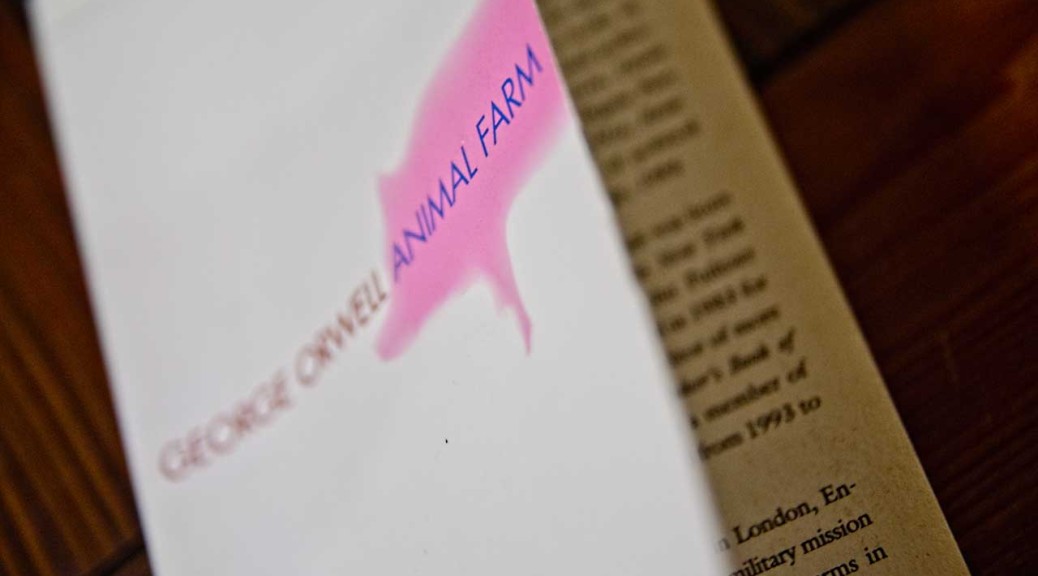
Animal Farm
Orwell, George. Animal Farm. New York, N.Y.: Signet Classics, 1996. Print. (First ed. 1945).
“Orwell called the book “a fairy story.” Like Voltaire’s Candide, however, with which it bears comparison, it is too many other things to be so handily classified.” p. vi
“Orwell started work on Animal Farm in 1943. As he discovered when he went looking for a publisher, Stalin’s Soviet Union was so popular that year in Britain and America that few wanted to hear or read anything critical of it.” p. viii
Orwell’s essay “”Politics and the English Language,” showing how politicians twist the language to distort and deceive.” p x
Candide by Voltaire
Darkness at Noon by Arthur Koestler
Brave New World by Aldous Huxley
Orwell and others “Why did they get it all wrong? For one thing, they were men who had come to maturity in the age of the dictators.” p. xiii
Rimsky-Korsakov‘s Le Coq d’Or “a fairy tale with a moral.” p. xxi
“The point about fairy-stories is that they are written not merely without a moral but without a morality. They take place in a world beyond good and evil, where people (or animals) suffer or prosper for reasons unconnected with ethical merit–for being ugly or beautiful respectively, for instance, or for even more unsatisfactory reasons.” p. xxii
“Moses, who was Mr. Jone’s especial pet, was a spy and a tale-bearer, but he was also a clever talker. He claimed to know of the existence of a mysterious country called Sugarcandy Mountain, to which all animals went when they died.” p. 17
“Some hams in the kitchen were taken out for burial,” p. 23
“A unanimous resolution was passed on the spot that the farmhouse should be preserved as a museum.” p. 23
“THE SEVEN COMMANDMENTS
1. Whatever goes upon two legs is an enemy.
2. Whatever goes upon four legs, or has wings is a friend.
3. No animal shall wear clothes.
4. No animal shall sleep in a bed.
5. No animal shall drink alcohol.
6. No animal shall kill any other animal.
7. All animals are equal.” p. 24-25
“The mechanical details came mostly from three books which had belonged to Mr. Jones–One Thousand Useful Things to Do About the House, Every Man His Own Bricklayer, and Electricity for Beginners.” p. 49
“But just at this moment Napoleon stood up and, casting a peculiar sidelong look at Snowball, uttered a high-pitched whimper of a kind no one had ever heard him utter before.
“At this there was a terrible baying sound outside, and nine enormous dogs wearing brass-studded collars came bounding into the barn.” p. 52-53
“”He fought bravely at the Battle of the Cowshed,” said somebody.
“Bravery is not enough,” said Squealer. “Loyalty and obedience are more important.” p. 55
“He was always referred to in formal style as “our Leader, Comrade Napoleon,” and the pigs liked to invent for him such titles as Father of All Animals, Terror of Mankind, Protector of the Sheep-fold, Ducklings’ Friend, and the like.” p. 93
“Squealer would talk with the tears rolling down his cheeks of Napoleon’s wisdom, the goodness of his heart, and the deep love he bore to all animals everywhere, even and especially the unhappy animals who still lived in ignorance and slavery on other farms.” p. 93
“By the evening of that day it was learned that he had instructed Whymper to purchase in Willingdon some booklets on brewing and distilling.” p. 108
“the retiring age had been fixed for horses and pigs at twelve, for cows at fourteen, for dogs at nine, for sheep at seven, and for hens and geese at five.” p. 112
“But the explanation was very simple. The van had previously been the property of the knacker, and had been bought by the veterinary surgeon, who had not yet painted the old name out. That was how the mistake had arisen.” p. 125
“No one stirred in the farmhouse before noon on the following day, and the word went round that from somewhere or other the pigs had acquired the money to buy themselves another case of whiskey.” p. 126
“Squealer was so fat that he could with difficulty see out of his eyes.” p. 128
“But the luxuries of which Snowball had once taught the animals to dream, the stalls with electric light and hot and cold water, and the three-day week, were no longer talked about. Napoleon had denounced such ideas as contrary to the spirit of Animalism. The truest happiness, he said, lay in working hard and living frugally.” p. 129
“neither pigs nor dogs produced any food by their own labour; and there were very many of them, and their appetites were always good.” p. 130
“Sometimes the older ones among them racked their dim memories and tried to determine whether in the early days of the Rebellion, when Jone’s expulsion was still recent, things had been better or worse than now. They could not remember. There was nothing with which they could compare their present lives: they had nothing to go upon except Squealer’s list of figures, which invariably demonstrated that everything was getting better and better.” p. 130
“She neighed again, and all the animals broke into a gallop and rushed into the yard. Then they saw what Clover had seen.
“It was a pig walking on his hind legs.” p. 132
“And finally there was a tremendous baying of dogs and a shrill crowing from the black cockerel, and out came Napoleon himself, majestically upright, casting haughty glances from side to side, and with his dogs gambolling round him.” p. 133
“There was nothing there now except a single Commandment. It ran:
ALL ANIMALS ARE EQUAL
BUT SOME ANIMALS ARE MORE EQUAL THAN OTHERS” p. 134
“He believed that he was right in saying that the lower animals on Animal Farm did more work and received less food than any animals in the country.” p. 137
“The creatures outside looked from pig to man, and from man to pig, and from pig to man again; but already it was impossible to say which was which.” p. 141
To Read:
Down and Out in Paris and London (1933) Novel
Burmese Days (1934) Novel
Homage to Catalonia (1938) Novel
Blue Jasmine
Watched:
Blue Jasmine | Woody Allen | Woody Allen | DP: Javier Aguirresarobe |2013
Watch:
A Streetcar Named Desire | Elia Kazan | Tennessee Williams | DP: Harry Stradling | 1951 |
Read:
Woody Allen article from the Guardian … “You’re probably happier in life if you can forget things,”




